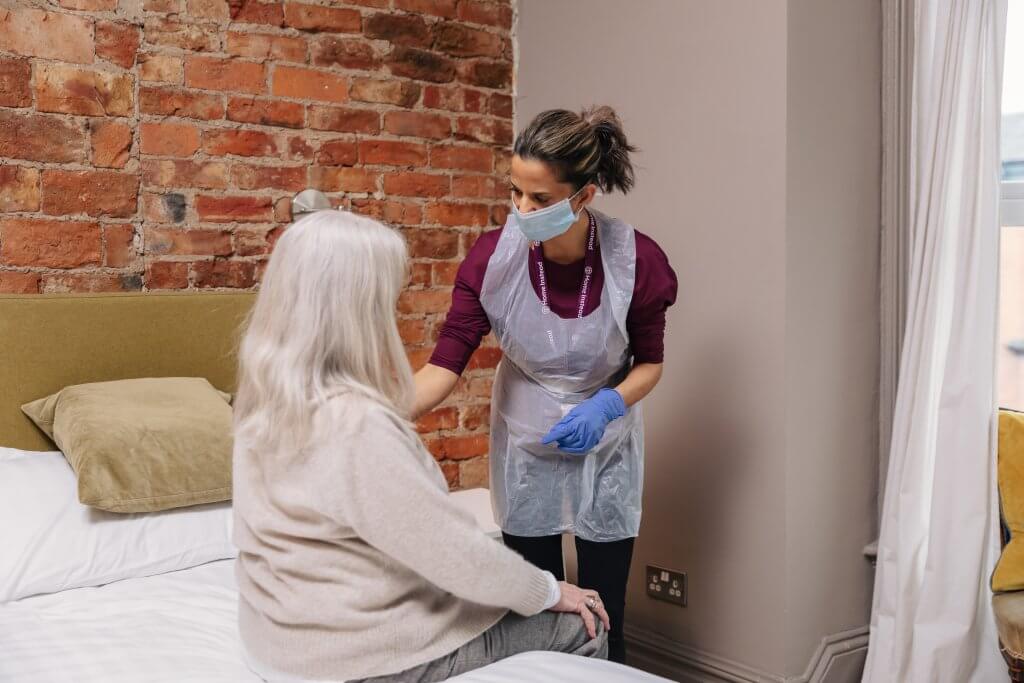
Palliative Care at Home
Our palliative care service benefits individuals with terminal illnesses who want to remain in their own homes, surrounded by the people that are important to them. We understand that at such a stressful and sensitive time, support from trusted specialist Care Professionals can make a huge difference.
Palliative care and support at home
Being told that you need palliative care and support can be distressing, emotional and stressful, not just for you but your loved ones around you. Our Care Professionals can support you and your loved ones with practical and emotional support with care tailored around your individual needs, allowing you to stay at home.When faced with a life limiting disease or illness, we understand that most people would prefer to remain at home where they feel comfortable and in control. It is an emotional time for all involved and we’re here to support your loved one and family through our bespoke palliative care at home services.The key to our palliative care at home is making sure your loved one is comfortable and living life as they choose during the final months or years of their life.

Truly holistic palliative care
Our specialist palliative care is brought to you in the comfort of your own home, in familiar surroundings, and by professionals you can trust. During the coming weeks and months there is a lot to consider and we can help support you with not just practical support such as home help and support with personal care, but we can also work alongside your health team to ensure you remain as comfortable as possible at home:
- Support you to live your life the way you want, alongside your health needs
- Be observant to health complications and prevent the need for hospital admissions
- Assist with your health needs and palliative and symptom management plans
- Work with you and your health care team reviewing your care needs, ensuring you are always receiving the best care for you

How can we help?
We've helped thousands of families to stay safe, comfortable and happy at home. Whatever situation you're facing, or whatever the question is, Home Instead is here to help.
Are you in need of a little guidance right away?
03300 583450Are you in need of a little guidance right away?
03300 583450Get in touch today to
see how we can help
Confused about home care? We can help.
We know you want the best for your loved one, so when it comes to arranging home care, we’ve made it easy with personalised, attentive care that adapts as your needs change.
Organising care shouldn’t feel like a trust fall. By taking the time to listen and understand your unique circumstances, we’re confident we can help your loved one live a more independent life at home, while helping you find balance as a caregiver.
From warm and friendly companionship, to specialised, practical care that puts their needs and preferences first, we are changing the way people think about home care.
Whatever questions you would like answered, we’re here to put your mind at ease – with no pressure to make a decision until you feel ready.

What is palliative care?
Palliative care at home is focused on improving the quality of life for those who are living with a life–threatening illness or condition. Palliative care with Home Instead enables you and your loved ones to spend more time on the things that are important to you. We can take the stress out of arranging appointments, help around the home, prepare nutritious meals and help with personal care when needed.

Benefits of palliative care
Our Care Professionals are fully trained and assessed as competent in your specialist care needs to support you in the best way, often relieving pressure on family caregivers. Evidence suggests effective support helps reduce the number of possible complications and can keep you comfortable at home usually without the need for hospital admissions. Care is carried out when you need it, not when it suits others.

Why choose palliative care at home?
Having support from Home Instead allows you to maintain your independence, routine, and lifestyle. Home Instead work with you to match your Care Professional to support you within your home and they are often matched in common interests and hobbies. Home Instead work with you and your clinical team to ensure the best care is delivered to the highest standard ensuring a fully bespoke and tailored care plan is provided.

Guides

How long does Palliative Care last?

Understanding the end of life care pathway

What is Palliative care?

End-of-life care vs Palliative care

When should someone be offered Palliative Care?

Palliative care at home: what to expect

The 5 stages of Palliative Care

Funding and who pays for Palliative Care

"Why Palliative Care is bad" - myths & misconceptions

Making an advance statement for care

Making an advance decision to refuse treatment: a living will

Health and welfare lasting power of attorney

What is an end of life care plan?

End of life care at home

An introductory guide to Palliative Care at home

Understanding Palliative Care

Expectations and planning for Palliative Care

Palliative progression and funding

Hospice care at home

Comfort care

Types of palliative care at home
Advice & Support
FAQs
When is palliative care needed?
Palliative care is an option that your clinical team may suggest if you or a loved one have received a diagnosis of a serious or terminal illness, such as cancer, lung disease or Alzheimer’s. Our Care Professionals can provide support that will alleviate discomfort and stress and allow a better quality of life.
How soon should palliative care begin?
Palliative care can be started at any stage of a serious illness, though it can be recommended to start as early as possible depending on the diagnosis and the treatment required. After finding out what treatments are required you can be easily make an informed decision on when palliative care is needed.
Is palliative care the same as end of life care?
Not necessarily. While palliative care can include end of life care, it is certainly not always the case and can last for a longer period of time. Some people are able to live comfortably for many years while receiving palliative care. The focus is always providing support as you need it to allow you to carry on with your daily life within the limits of your condition.
Will palliative care cause me to lose independence?
Our Care Professionals understand that maintaining your control over your daily life is important. Depending on what care you need for your condition you may need help with a few things or more help with a lot of your usual tasks. The level of help required is likely to change over time, but Home Instead will be there to ensure you keep as your independence for as long as possible.
Should I continue palliative care after successful treatment?
During your illness you may receive successful treatment from your clinical team. Depending on the outcome of this treatment you may no longer require palliative care, however it may be beneficial to continue for a short while. During the recovery process it can be beneficial to you and your loved ones to have some relief from the physical and emotional stress a serious illness can cause.








